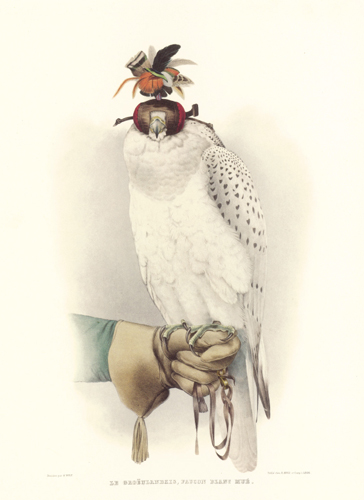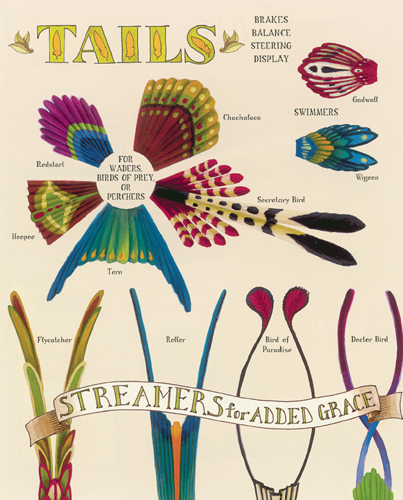
This Article From Issue
September-October 2014
Volume 102, Number 5
Page 392
DOI: 10.1511/2014.110.392
EXTRAORDINARY BIRDS: Rare Book Selections from the American Museum of Natural History Library. Paul Sweet. x + 134 pp. Sterling Signature, 2013. $50.00.
AVIARY WONDERS INC.: Spring Catalog and Instruction Manual: Renewing the World’s Bird Supply Since 2031. Kate Samworth. 32 pp. Clarion Books, 2014. $17.99.
Beyond stunning good looks and the elaborately plumed birds on their covers, the books before me would appear to have little in common. But cohabiting books may strike up unexpected conversations, and such is the case with a pair keeping company on my shelf of current favorites.

From Aviary Wonders Inc.
The first is a history of ornithological artwork. Secured with a pale blue ribbon into a handsome clamshell box decorated with John James Audubon’s painting of a fierce-eyed brown pelican, the book arrives accompanied by a sheaf of ornithological plates. It’s a work aimed unambiguously at adult readers. The second is a fanciful work of children’s fiction. With pulsing jewel tones, breezy descriptions, and snippets of natural history, this book is flashy. Further, it poses as a product catalog for a company founded in the year 2031.
One book looks to the past, the other to the future. Nonetheless, they make fine companions. Together, one informs the other, offering Januslike views along a continuum of thought about the natural world.

From Extraordinary Birds.
With its trove of ornithological plates selected from the American Museum of Natural History’s rare book collection, Extraordinary Birds, by museum ornithology collections manager Paul Sweet, is an unforgettably beautiful work. (It’s the second in the museum’s Natural Histories series, after the eponymous Natural Histories; the third, Opulent Oceans, will appear in late 2014.) Beyond the book’s obvious aesthetic attributes, the art featured throughout is inextricable from the science underlying it. A history of ornithology by Peter Capainolo, himself an ornithologist at the museum, opens the book, diving into the basics (What is ornithology? What is a bird?) before covering topics such as bird anatomy, the evolution of ornithological science, and the history of printing scientific books about birds. This history lays a firm foundation for the remainder of the work, made up of dozens of illustrated plates, which depict works created by European and American artists from 1555 to 1930. Each is accompanied by an essay in which Sweet discusses the origin of the work, revealing much about the history of ornithological art and literature along the way.
The new guides, paired with improved optics, encouraged a shift toward watching birds instead of hunting specimens.
The publicity materials for Aviary Wonders Inc., written and illustrated by painter and printmaker Kate Samworth, reveal it’s intended for readers age 9 through 12. But within this colorful children’s book beats a satiric heart; marketing lingo, consumer culture, and the commodification of nature all come under scrutiny. A “spring catalog and instruction manual” for a fictional bird-building company, it brims with vivid illustrations of ways these birds may be customized and accessorized. These birds, we learn, may be kept as pets or released into the wild to help shore up declining avian populations. With its troubleshooting guide, tips on how to construct a bird for proper balance, and a sample order form, the book invites readers of any age to try their hand at bird design. It’s not all fun and games, though. Certain designs pay homage to extinct species, and here the catalog descriptions delve briefly into natural history. This tidbit accompanies the Moa body design: “The Moa was large, flightless—and tasty! The last of the species was eaten in the fifteenth century.”

From Aviary Wonders Inc.
In both books, the subject of conservation is never far from the surface—especially how knowledge of the avian world leads to a deeper understanding of habitat and species protection. In his discussion of the history of ornithological publishing in Extraordinary Birds, Capainolo describes printing advancements that made field guides both easily portable and affordable for the general public, beginning in 1887 with Florence Merriam’s “Hints to Audubon Workers: Fifty Birds and How to Know Them.” Roger Tory Peterson’s famed Peterson Identification System, which he introduced in his first field guide in 1934, made quick identifications easier for naturalists. The system’s popularity fostered droves of enthusiastic new birders. The new guides, paired with improved optical instruments (intended for astronomers and soldiers but embraced by naturalists), encouraged a shift among recreational naturalists toward watching birds instead of hunting specimens. This shift, Capainolo says, “became a driving force behind the major conservation movements of the twentieth century.” As professional ornithologists and recreational birders contributed data that advanced our understanding of birds and their habitats, the result over time has been profound. Capainolo remarks, “Some bird species are highly adapted to unique, often small, habitats, while others can occupy broader ranges of acceptable habitat. We now know it is crucial to conserve rare habitats, not just for birds but for the rest of the biota within them.”
"The Moa was large, flightless—and tasty! The last of the species was eaten in the fifteenth century."
These ideas resonate in Aviary Wonders Inc. Samworth’s bold brushstrokes and saturated colors belie a disquieting starkness. In Extraordinary Birds, Sweet describes the historical moment (in the last half of the 1700s) when artists began depicting birds amid the flora of their natural environments; as one can see from the plates, it’s an extraordinary shift. So it’s striking to see Samworth’s birds, rarely represented in any kind of environment, existing in such isolation. The birds are shown strictly for the (fictional) consumer’s perusal. More troubling are the handful of illustrations depicting these birds in context. A section providing assembly instructions opens with the image of a newly purchased fowl ready for outfitting. Resting on a pillow as it gazes at the reader, the bird isn’t yet recognizable as a bird. Imagine a seal-shaped creature with a blunt snout where its beak should be; plucked, bony arms in place of wings; and no legs. Subsequent pages illustrate how to attach the beak, tail, legs, and wings with cumbersome-looking straps. The section called “Teaching Your Bird to Fly” shows the fully assembled bird being lifted into a flying position by its owner. The accompanying caption helpfully suggests: “Double-check: All parts must be securely attached before your bird learns to fly.” Earlier, the instructions note that your bird cannot feed itself until its beak has been attached.
These books have much to say in conversation with each other. Together, they have much to teach about observing the natural world and how, beyond basic bird watching, we might see everyday wonders of fowl and flora anew.
Dianne Timblin is interim book review editor for American Scientist and author of the poetry chapbook A History of Fire (Three Count Pour, 2013). Find her on Twitter: @diannetimblin.
American Scientist Comments and Discussion
To discuss our articles or comment on them, please share them and tag American Scientist on social media platforms. Here are links to our profiles on Twitter, Facebook, and LinkedIn.
If we re-share your post, we will moderate comments/discussion following our comments policy.